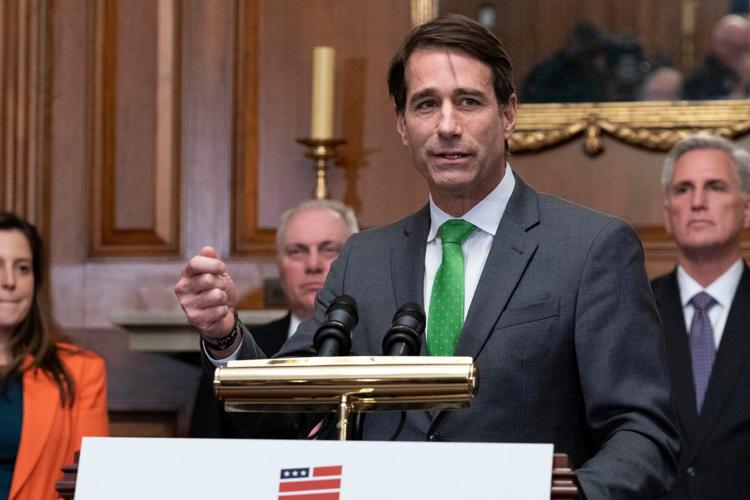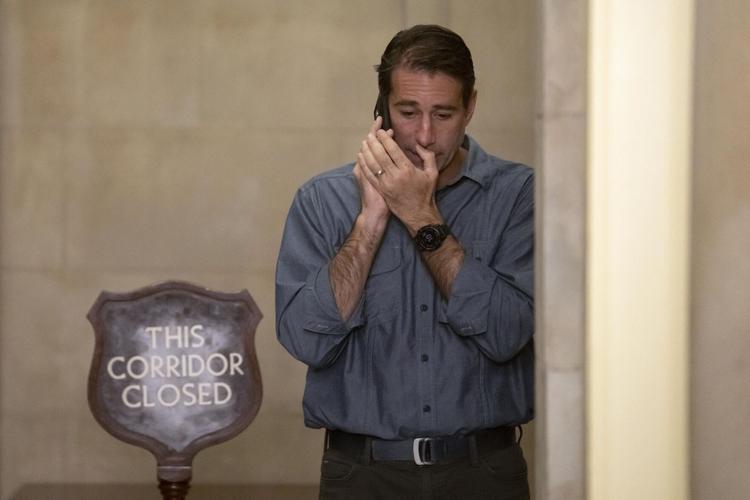It’s hard to overstate how high U.S. Rep. Garret Graves was riding a year ago.
He had just helped corral the votes of Republican colleagues to elect Kevin McCarthy speaker of the House. That put Graves in line for a plum position.
Back home in Baton Rouge, Graves was so popular that major GOP donors were beseeching him to run for governor as an alternative to then-Attorney General Jeff Landry, the more conservative frontrunner.
Today, Graves’ world seems to be crashing down.
He managed to antagonize both Landry and U.S. Rep. Steve Scalise in 2023, and around the same time, federal courts unexpectedly signaled that Louisiana would have to draw a new congressional map to create a second majority-minority district.
As a result, Landry – now the governor – and the Republican-controlled Legislature carved up Graves’ once-safe 6th Congressional District to create a second Black-majority seat in Louisiana, a move that could put him out of Congress next year.
“Garret was on top of the ladder,” said former U.S. Rep. Billy Tauzin, one of Graves’ former bosses. “What’s happening now is sad – for him and Louisiana. He’s one of the brightest, most policy-driven people I know.”
Graves says he'll seek reelection this year no matter what.
“I expect to run, and I expect to be re-elected,” Graves said in an interview.
Making powerful enemies
After deciding not to run himself for governor, Graves ran afoul of Landry by backing the bid of Stephen Waguespack, an ally who was then the head of the Louisiana Association of Business and Industry. The other six Republican members of Louisiana’s congressional delegation either supported Landry or didn’t endorse.
Apart from payback, Landry has an additional reason to want to sideline Graves, political insiders say. As a sitting congressman with an ability to raise money, Graves could be a formidable challenger to Landry’s re-election in 2027.

Rep. Steve Scalise, R-La., congratulates House speaker-elect Rep. Mike Johnson, R-La., after Johnson was elected the new House speaker, at the Capitol in Washington on Oct. 25, 2023.
Graves, meanwhile, upset Scalise by not publicly supporting his bid to be speaker in October after McCarthy resigned – and pointedly questioning the plan to "give everyone one rung of promotion.” Not only that, Graves privately spread the word that Scalise’s cancer diagnosis made him a health risk for the job, Scalise has indicated. Graves has denied this and said he always supported Scalise.
“I think he just got crossways with the new governor by not supporting him in the primary and with Steve Scalise when he was running to be speaker,” said former U.S. Sen. John Breaux, another member of Congress Graves worked for. “Both of those two situations are now reflected in what’s happening with reapportionment.”
Landry has said repeatedly that if lawmakers don’t draw a new map with two majority-Black districts, U.S. District Court Judge Shelly Dick – who they note was appointed by President Barack Obama – will do so, in a way that might be less favorable to Republicans. So one GOP district would have to go. After calling legislators into the special session, Landry pushed lawmakers to sacrifice Graves.
While endorsing the plan they enacted, state legislators repeatedly said that they wanted to draw a map that protected four of the five Republicans in the House: Scalise, Speaker Mike Johnson, U.S. Rep. Julia Letlow and U.S. Rep. Clay Higgins. Practically no one said they wanted to protect Graves.

U.S. District Judge Shelly Dick
Graves seems undaunted. He has indicated that he believes Dick or the 5th U.S. Court of Appeals will reject the new map, enabling him to run in a district that resembles his current one.
But Dick already rejected the map Republicans drew in advance of the 2022 elections, saying it diluted Black representation.
Graves, however, noted that Dick has not held a trial on the merits of that question. She has scheduled one for next month, which led to the GOP scramble to adopt a new map first.
“Bottom line, no court has mandated that the state redraw the maps," Graves said. "It’s sort of like changing answers on your test before it’s graded. Get somebody to go through and tell you what’s right and what’s wrong (with the existing map) and then go back and correct them. It’s premature to do this right now.”
Long odds
But Graves’ voice may be a lonely one, with most Republicans as well as the NAACP Legal Defense Fund endorsing the new map. If it withstands legal scrutiny, Graves would have to run in his 6th District, which has now been designed to elect a Black Democrat, or challenge Scalise, Letlow or Higgins, whose districts include areas near his home. There’s no prohibition on him running in a district where he doesn’t live.
Graves, 51, was first elected to the House in 2014 by finishing ahead of three major Republicans in the primary and then defeating 87-year-old former Gov. Edwin Edwards, a Democrat, in the runoff. He has won at least 62% of the vote in winning reelection four times.
Graves came to Congress with a deep understanding of how Washington functions, having served as a longtime aide to Tauzin and on various House and Senate committees. Graves also understood state politics from his tenure as then-Gov. Bobby Jindal’s point person on the coastal master plan.
Graves quickly won a reputation as a hard worker who was willing to dive into the details of legislation.

U.S. Rep. Garret Graves, R-Baton Rouge, tours part of the Comite River Diversion Canal project where stone has been laid down along the canal on June 29, 2023 in Zachary.
Despite a reputation as a wonk who could work with Democrats, he won plaudits from conservatives by voting with then-President Donald Trump 90% of the time.
In addition, after the attack on the Capitol by Trump supporters on Jan. 6, 2021, Graves voted against certifying some of Joe Biden’s electors.
Graves also opposed impeaching Trump over his role in the insurrection.
Progressives have generally applauded Graves for taking the lead among Republicans in saying that climate change is real.
Even so, as the New Yorker magazine reported in a 2019 profile, critics have noted that he consistently votes with the oil and gas industry and was a major recipient of their campaign contributions.
Some saw Graves as trying to give voice to both sides, while others said he was trying to have it both ways.
“Graves’s position depends on his ability to persuade people in both parties of two ideas that are generally thought to be contradictory: that the environment urgently needs to be saved, and that the fossil-fuel industry can ultimately be a hero of our climate story, rather than the villain,” the magazine reported.
Earning his stripes
Graves catapulted onto the national stage in January when he played a role in breaking a deadlock by helping persuade 21 conservative hard-liners to elect McCarthy as speaker on the 15th ballot.

U.S. Rep. Garret Graves, R-Baton Rouge, talks on his cellphone as he stands in the entrance to the offices of the speaker of the House on Oct. 4, 2023 .
Two weeks later, McCarthy announced Graves would chair the Elected Leadership Committee, vaulting him into the senior ranks of the House. In that role, Graves oversaw meetings of key Republican House leaders. McCarthy likened Graves to an “assistant coach.”
In the meantime, Graves was weighing whether to jump into the governor’s race. Analysts saw him as the biggest threat to Landry, especially after U.S. Sens. John Kennedy and Bill Cassidy both said they wouldn’t run.
In early 2023, Landry and Graves met at a restaurant in Livonia to see if they could hash out their differences. They couldn’t.
In March, Graves announced that he wouldn’t run but emailed his supporters, “In the coming days, the field for governor will brighten. And Louisiana will have a generational opportunity to write America’s greatest comeback story.” It was a clear shot at Landry. A short time later, Graves endorsed Waguespack while appearing with him in a video.
In May, McCarthy showed his confidence in Graves by tasking him to work out a deal with President Joe Biden where Republicans agreed to raise the debt ceiling in exchange for spending cuts. McCarthy and Graves secured the deal. But it needed Democratic votes to win, and hard-right conservatives denounced it. They went on to oust McCarthy as speaker in October.
Scalise, the majority leader, was next in line. Supporting a fellow member of the state’s delegation seemed like a no-brainer to most Louisianans.
But when asked directly by CBS-TV if he would support Scalise, Graves wouldn’t commit. “There are a handful of people being discussed," he said. "There are some qualified candidates. I think it’s premature to get into that discussion."
Graves went on to talk up the positives of Rep. Jim Jordan of Ohio, a right-winger and Scalise’s primary foe. His response baffled Breaux.
“It’s very much in the interest of a small state,” Breaux said. “I was surprised that Garret wasn’t on board early on.”
A second act?
After Scalise couldn’t secure the votes, support eventually coalesced around Johnson, the Republican from suburban Shreveport, and he was elected speaker.
Johnson quickly removed Graves from his leadership post, although he still might be elected by his colleagues next year to become chair of the Transportation Committee. If that happened, he could direct big dollars to infrastructure projects in Louisiana.
Graves didn’t graduate from college, but he has always impressed colleagues with his intelligence. But he’s also come across at times as a know-it-all, say Washington sources.
“He generally is smarter than anyone else in the room – and that’s his problem,” Tauzin said. “People sometimes are offended by that. It’s kind of hard to hide that sometimes. That can hurt you in politics.”
Graves seems to have few friends in politics today.
But don’t count him out, Tauzin said.
“I’ll make a prediction: if he doesn’t run for the House, you can look forward to Garret Graves running for the Senate,” Tauzin said.
Cassidy, who has angered many Republicans by voting to certify Biden’s election and convict Trump of insurrection, is up for reelection in 2026.
-Staff writer Mark Ballard contributed to this report.







